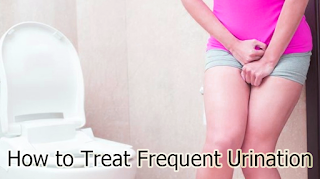How to Treat Frequent Urination
There are many things that can cause frequent urination, ranging from mild to severe. How to treat frequent urination also varies and needs to be adjusted to the cause. Therefore, it is important for you to know the cause of frequent urination so that it can be treated appropriately.
The normal frequency of urination is between 4 to 8 times per day. If you drink too much water, drink close to bedtime, and consume foods or drinks containing caffeine, the frequency of urination will increase.
However, if you urinate frequently even though you don't drink much water or don't eat foods and drinks that can cause frequent urination, then this could be a sign of certain medical conditions that you need to be aware of.
Causes of Frequent Urination
If you experience excessive urination for a long time this could be a symptom of a certain medical condition. Some of the conditions that cause frequent urination are as follows:
1. Urinary tract infection
Generally the problem of frequent urination is caused by a urinary tract infection. This condition can occur when bacteria invade the urinary tract.
This can cause inflammation, so the bladder's ability to hold urine is impaired. Typical symptoms that accompany a urinary tract infection are lower abdominal or waist pain and fever.
2. Overactive bladder
Overactive bladder is a condition when the bladder contracts excessively even though the urine is not full. This can cause frequent urination.
In addition to frequent urination, overactive bladder is also characterized by the urge to urinate that is difficult to delay and frequent awakenings at night to urinate.
3. Prostate disorders
An enlarged prostate can put pressure on the urinary tract (urethra) so this can cause the bladder wall to become more sensitive. As a result, it becomes easier for the bladder to contract even when there is very little urine. This is what can cause frequent urination.
4. Kidney infection
Kidney infections are often the result of bladder infections. Usually the symptoms of kidney infection appear after two days of infection. Symptoms experienced by patients with kidney infections include frequent urination, a burning sensation or pain when urinating, back pain and fever.
5. Kidney stones
Frequent urination can be a symptom of kidney stones. In addition to frequent urination, symptoms suffered by patients with kidney stones are lower abdominal pain, urine turning cloudy, blood in the urine, nausea and vomiting.
6. Diabetes
The first symptom of diabetes is frequent urination. This happens because the body tries to excrete unused glucose in the blood through urine.
7. Diverticulitis
Diverticulitis is an infection that occurs in diverticula. Diverticula are sacs that form along the lining of the colon. Diverticulitis is characterized by frequent urination, pain in the lower left abdomen, diarrhea, and bleeding from the anus.
8. Pregnancy
During the first trimester of pregnancy, pregnant women usually urinate more often. This happens because the growing uterus can put pressure on the bladder. To overcome this, pregnant women can do Kegel exercises regularly.
Also read articles about: How to Prevent Frequent Urination during Pregnancy.
9. Diuretic side effects
The purpose of using diuretic drugs is to get rid of excess fluid in the body. This type of drug is often used for the treatment of hypertension or fluid buildup in the body to be excreted by the kidneys. That's why someone who takes this type of drug frequency of urination can increase.
In addition to being caused by some of the diseases above, problems with frequent urination can also be caused by strokes, nervous disorders, and anxiety disorders.
How to Treat Frequent Urination At Home
How to cure frequent urination is done according to the underlying cause. Therefore, to determine the cause, you should immediately consult a doctor.
When you check with the doctor, the doctor will ask your medical history and perform a series of physical examinations and supporting examinations to determine the cause of your frequent urination. If the doctor has determined the cause of your frequent urination, then the doctor will plan the appropriate treatment.
For example, if the problem of frequent urination is caused by diabetes, the treatment taken is to control blood sugar levels in the body. Meanwhile, the treatment of frequent urination due to an overactive bladder can be helped by how to stop frequent urination naturally:
1. Bladder training
If you have difficulty controlling urination, then you can train your bladder to control the timing of urination. Try forms of behavioral therapy such as gradually increasing the time you need to urinate. This is to train the bladder to hold urine longer, so that the frequency of urination can return to normal.
2. Doing Kegel exercises
Kegel exercises are exercises that aim to strengthen the muscles around the bladder and urethra, thereby reducing the urge to urinate. This exercise not only strengthens the muscles that regulate the urethra but also the pelvic muscles. This is because controlling the bladder can be done with exercises that focus on the pelvic muscles. Do Kegel exercises for 5 minutes 3 times a day.
3. Regulating diet
To reduce the urge to urinate, you should avoid foods and drinks that can irritate the bladder or are diuretics. In addition, you should reduce the consumption of foods or drinks that can increase the urge to urinate such as foods that contain caffeine, artificial sweeteners, and spicy foods. Instead, you can fulfill your fiber intake and drink water, but you should avoid drinking a lot just before bedtime at night.
The causes of frequent urination can vary and how to treat frequent urination is not the same. Therefore, when you experience symptoms of frequent urination, you can consult a doctor, so that the cause of frequent urination can be ascertained and can be treated appropriately.






